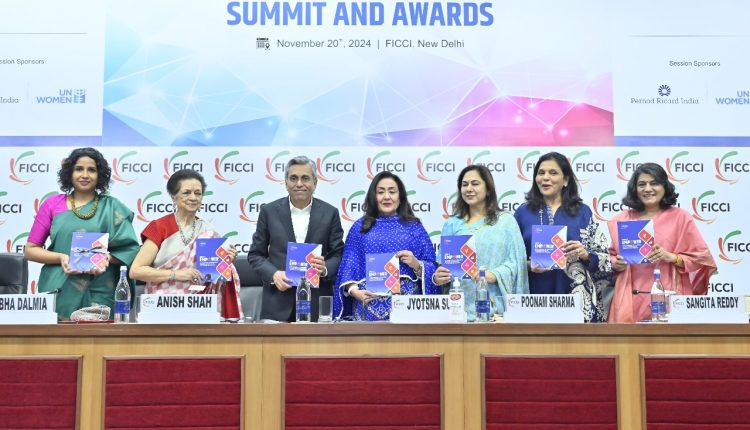Corporate Gender Equity Champions Recognised at FICCI Women in Workforce Summit and Awards
NEW DELHI. 20 NOVEMBER 2024: Twelve organisations received recognition for advancing workplace gender equality at FICCI’s inaugural Women in Workforce Summit and Awards. The companies were honoured for implementing innovative policies spanning senior leadership representation, career development, and employee well-being initiatives.
The awards, evaluated through a three-tier process by an independent jury chaired by Alka Mittal, former managing director of Oil and Natural Gas Corporation, recognised achievements across four categories. Belrise Industries, Kinetic Green Energy & Power Solutions, and Bharat Hotels emerged as leaders in women’s representation at senior management, with Giri Trading Agency receiving a special jury commendation.
Muthoot Finance and NatWest Digital Services India were recognised for their comprehensive programmes in the Career Development, Skill Development & Mentorship category. L’Oréal India and Raphe mPhibr Private Limited secured awards for health and wellbeing initiatives, with Abbott India receiving a special mention from the jury.
The awards’ Impactful Care Ecosystem for Employees category saw ITC Limited, Hero Future Energies, and Tide India being honoured, while Power Grid Corporation of India received a special commendation for its initiatives.
Speaking at the summit, FICCI President Dr Anish Shah emphasised that equality should be a cornerstone of every organisation. He noted that a culture of inclusion, where everyone feels welcome, makes a huge difference to organisations in terms of performance. Dr Shah announced an ambitious target to create opportunities for 4 million women in the workforce over the next three years as part of its four key focus areas for Viksit Bharat. He urged corporate India to introspect, examine their policies, and ensure appropriate support systems are in place for all employees at different life stages to drive transformative changes in workplace gender equity.
During the FICCI event, McKinsey & Company shared a preview of their forthcoming “Women in the Workplace” report, done with support from FICCI in onboarding participants in India. The report highlighted the reality of women’s underrepresentation in India’s formal workforce. The comprehensive study, which analyzed 325 companies and surveyed over 1.3 million employees across India, Kenya, and Nigeria between March and June revealed that C-suite representation for women in India remains below 20 percent.
Presenting the report findings, Mr Vivek Pandit, senior partner at McKinsey & Company, noted, “While women’s underrepresentation in the formal workforce is a near-universal problem, the findings reveal that solutions must account for vastly different starting points.” He added: “By recognising unique challenges Indian women face and the true starting position of your own organisation, you can bridge the representation gap and unlock the full potential of your talent.”
The McKinsey study highlighted concerning trends in career progression. Women account for only 33 per cent of entry-level positions, declining to 24 per cent at managerial levels and further dropping to 17 per cent in C-suite positions. The research indicated that men are more than twice as likely to advance from entry-level to managerial roles, while women are 1.3 times more likely to leave their roles.
However, the research highlighted a significant bright spot at senior levels, where women’s attrition rates substantially decrease beyond managerial positions, with representation declining by less than two percentage points on average with each step up the corporate ladder.
Among other dignitaries at the Summit, Past President, FICCI and Mentor, FICCI Women Empowerment Committee and Joint MD, Apollo Hospitals, Dr Sangita Reddy, emphasised that equity and parity for women in workforce could add $28 billion to the global economy. “It’s not just about economic value, but about the quality of life and freedom to make choices,” said Reddy, highlighting FICCI’s initiatives, including the TechEquity platform, a pioneering digital platform launched during India’s G20 presidency. “As the world moves into a knowledge economy, we need digital skills and capability to enable women’s equality,” said Reddy, describing the platform’s reach across 120 languages with 150 courses and expanding to 50 countries now. The initiative offers free courses tailored to different educational levels, from basic digital literacy to advanced skills, enabling women to participate in the growing digital and gig economy.
The summit showcased Mahindra Group’s flagship women empowerment initiative, the Kaabil program, which bridges the gap between education and employability. “While only 6 out of 10 women formally work in India, increasing women’s workforce participation could boost GDP growth above 9 per cent,” said Ms Asha Kharga, Chair, FICCI Women Empowerment Committee & Executive Vice President – Chief Customer & Brand Officer, Mahindra Group, alluding to a World Bank report. The program, which has already skilled 800,000 women across 19 states through partnerships with 2,000 institutions, aims to empower one million women annually from 2027.
FICCI’s Past President, Dr Jyotsna Suri, said, “If India has to become a 5 trillion economy, it cannot do so without the contribution of 50 per cent of its population.”
Ms Poonam Sharma, Sr. Vice President, FICCI FLO, emphasised that women’s workforce participation is now a strategic imperative for India’s economic growth. “India requires an additional 400 million women in the workforce to add USD 14 trillion to the economy, which means doubling our current female labour force participation from 37 per cent to 70 per cent,”
Ms Abha Dalmia, Founding Past President, FICCI FLO, traced the organisation’s remarkable growth from 150 members in 1983 to a dynamic network of 20 chapters with over 12,000 members today. Ms Dalmia emphasised that women’s participation is not just a choice but an economic imperative for India’s future.
The summit emphasised the need for targeted interventions. McKinsey recommended three critical steps for employers: diagnosing gender diversity challenges in talent pipelines, auditing policy presence, utilisation and implementation, and enhancing tracking and accountability structures.
The event also saw the release of playbook – Skill and Empower: A Compilation of Impactful Skilling Initiatives by Corporates for Women


